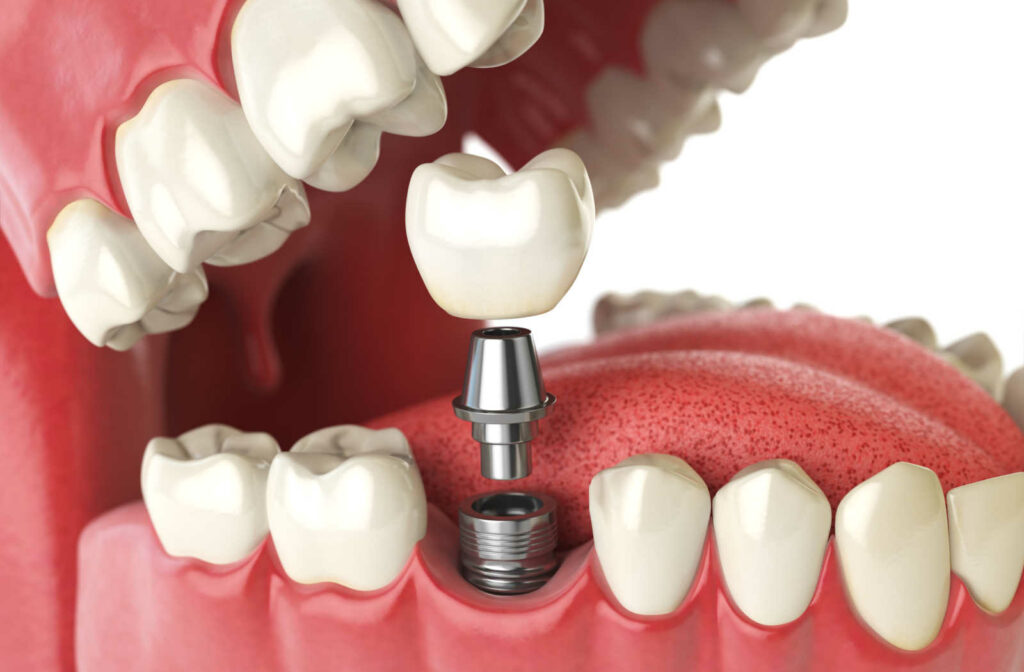Dental crowns are commonly used to replace a missing tooth, and the dental implant is used to anchor the crown and keep it in its place. Typically, the implant is performed using screw-retained dental crowns or oral cement.
Before recommending a dental implant, we need to conduct a thorough examination of your teeth. Please book an appointment at Marks Dentistry, and we can assess your oral health and provide a referral for your dental surgery.
Attaching Dental Crowns to Implants
Your dental implant and crown will likely be performed by a trained oral surgeon who chooses between two procedures. Here are 2 of the most common ways that dental crowns are attached to implants:
Using Oral Cement to Attach Dental Crowns
Your oral surgeon may recommend using oral cement for dental crowns that are placed onto implant abutments. This procedure involves carefully measuring the abutment, a piece that attaches to the implant, and taking an impression of the abutment. After this, your oral surgeon will have the crown made and put it into place using special oral cement.
Advantages of oral cement:
- Aesthetics: Cement won’t require a hole in your tooth like a screw-retained dental crown.
- Accessibility: It is easier for the dentist to place oral cement on teeth that are harder to reach.
Disadvantages of oral cement:
- Cracks of the tooth and cement
- Replacement: It is easier to replace a screw-retained dental crown
Screw-Retained Dental Crowns
In this procedure, the crown is screwed directly into the abutment, which is attached to the top part of the screw that has been drilled into the jawbone.
Advantages of having a screw-retained dental crown:
- Retrievability: It is easy to remove the implant crown or tighten the screw when necessary.
- Hygiene: You will not need to worry about excess cement left behind and damage to the soft tissue in your mouth, as this procedure does not use it.
Disadvantages of screw-retained dental crowns:
- Chipping of the crown
- It is harder to disguise the screw, and there can be some discolouration
- Screw loosening
What are Dental Implants?
Dental implants are surgical procedures typically performed on a person with missing or damaged teeth. It entails replacing the root of your tooth with a small cylinder metal post that is then fitted with an artificial tooth that acts the same as a natural one.
What Are the Benefits of a Dental Implant?
There are numerous reasons why someone would choose or be recommended to have a dental implant. Here are a few of the more common reasons:
- Improves your speech
- Replaces a missing or damaged tooth
- It makes eating and chewing easier
- Aesthetics of your teeth and restored appearance
Dental implants require diligent care like your natural teeth and should be kept clean and plaque-free. We recommend booking regular cleaning to keep your smile looking healthy and bright.
What are Dental Crowns in Relation to Implants?
Dental crowns are a covering placed over the top of your tooth or implant. It is meant to help restore the strength and shape of the tooth. Dental crowns can be made out of a variety of different materials. Still, some of the more common ones include the following:
- Metal: Gold, palladium, nickel, and chromium are all commonly used metals to create a crown as they are strong and rarely break.
- Porcelain: This is a great choice for crowns as it is easy to match the colour of your natural teeth. However, it has a higher risk of breaking or chipping but can be infused with metal for more structural support.
- All-resin: Resin is one of the cheaper options but tends to wear down faster than the others.
- Ceramic: This is a great choice for matching the natural tooth’s colour and providing long-lasting structural support.
In most cases, a dental crown is made to cover an implant and increase the structural integrity and aesthetic of the tooth.
How to Take Care of Your Crowns
Dental crowns typically last anywhere from 5 to 15 years. The duration of your crown is primarily based on how well you take care of them and your oral care practices. Here are a few tips to help your crown last longer:
- Try not to grind your teeth or consider wearing a nightguard when sleeping
- Try to avoid chewing on things like ice, fingernails, or other hard things that could break the crown
- Follow good hygiene practices by brushing and flossing your teeth daily
- See the dentist regularly to have your teeth examined and professionally cleaned
Don’t hesitate to reach out to our friendly staff at Marks Dentistry to ask any questions about taking care of your crown at home.
Restore Your Smile
At Marks Dentistry, our modern facility and experienced staff are happy to provide you with advice and assistance in caring for your teeth. All you need to do is book an appointment today to discuss your oral health with our team.




